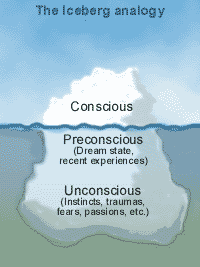
THE ID (“It”): functions in the irrational and emotional part of the mind. At birth a baby’s mind is all Id - want want want. The Id is the primitive mind. It contains all the basic needs and feelings. It is the source for libido (psychic energy). And it has only one rule --> the “pleasure principle”: “I want it and I want it all now”. In transactional analysis, Id equates to "Child".
THE EGO: (“I”): functions with the rational part of the mind. The Ego develops out of growing awareness that you can’t always get what you want. The Ego relates to the real world and operates via the “reality principle”. The Ego realises the need for compromise and negotiates between the Id and the Superego. The Ego's job is to get the Id's pleasures but to be reasonable and bear the long-term consequences in mind. The Ego denies both instant gratification and pious delaying of gratification. The term ego-strength is the term used to refer to how well the ego copes with these conflicting forces. To undertake its work of planning, thinking and controlling the Id, the Ego uses some of the Id's libidinal energy. In transactional analysis, Ego equates to "Adult".
THE EGO: (“I”): functions with the rational part of the mind. The Ego develops out of growing awareness that you can’t always get what you want. The Ego relates to the real world and operates via the “reality principle”. The Ego realises the need for compromise and negotiates between the Id and the Superego. The Ego's job is to get the Id's pleasures but to be reasonable and bear the long-term consequences in mind. The Ego denies both instant gratification and pious delaying of gratification. The term ego-strength is the term used to refer to how well the ego copes with these conflicting forces. To undertake its work of planning, thinking and controlling the Id, the Ego uses some of the Id's libidinal energy. In transactional analysis, Ego equates to "Adult".
There are aspects of the Id, the Ego and the Superego in my life. Growing up I did not tend to listen to my id because I learnt from an early age that I cannot always get what I want in life. My brother was born when I was 15months old and I was soon having to compete for my parents attention. I learnt that even if I stood in front of them and screamed I would not always get their attention. The id in me actually seems to have developed more just after I became a teenager. I would come home from school and just sit in front of the TV for the rest of the evening completely ignoring the pile of homework that I had, although somehow I generally managed to submit it on time.
The ego and the superego are much more prominent in my life now. I have realised that by simply neglecting my school work I will not achieve what I want to in life and that my grades are importantif I want to go to university. I have quite strong morals that stem from my Christian faith and I will not go against those morals.
Bibliography:
"Structure of Mind: Freud's Id, Ego & Superego." 24 Jul 2004. 20 Mar 2008 http://wilderdom.com/personality/L8-4StructureMindIdEgoSuperego.html.
Keegan, Gerard. Gerard Keegan's psychology site. 26 Oct 2003. 1 Apr 2008 .
No comments:
Post a Comment